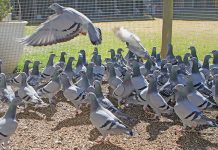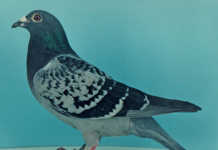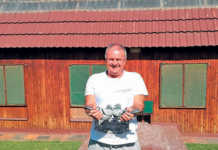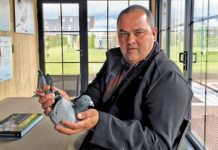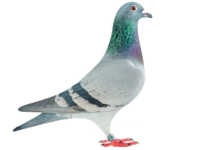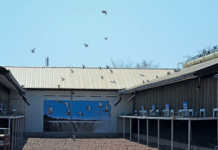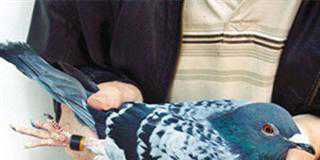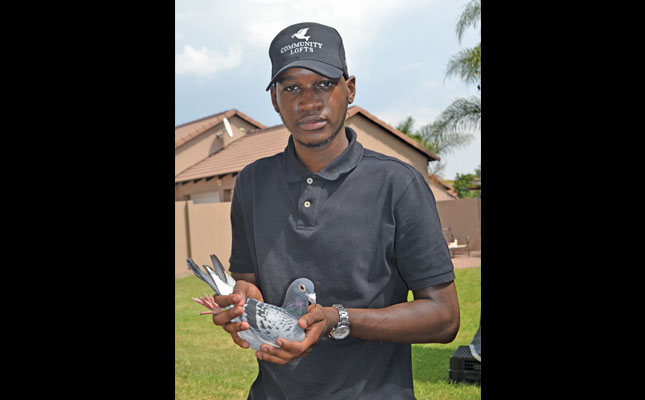
Photo: Susan Marais
Nineteen-year-old Lodumo Nkala, based in Pretoria, became interested in racing pigeons at the age of nine, when he saw a flock of the birds fly over his grandparents’ garden in Rustenburg.
The pigeons belonged to the father of his soon-to-be best friend, Matthew Last, and Last taught him the basics of pigeon racing when he asked him to help clean out his father’s lofts.
READ Breeding a million-dollar bird
“From then on, my love for pigeons grew, and I made it my goal to one day own racing pigeons,” Nkala says.
In 2017, while visiting his grandparents, who had subsequently moved to Hammanskraal in northern Gauteng, Nkala noticed a very colourful wild pigeon in the maize fields.
“Its beautiful colour attracted me,” he remembers. Thus, he set a primitive trap for the bird and caught it.
At the time, he didn’t have a pigeon loft, so he kept the bird in his grandparents’ spare bedroom. When he returned home to Johannesburg, where he lived at the time, he took the pigeon with him, and set about building a small loft out of spare planks of wood.
“I remember going through bins on trash day to see what scrap material residents threw away that I could use.”
Once the loft was ready, he decided that he wanted to get more pigeons to grow his flock.
“We lived close to Cedar Square [in Fourways], and there had been close to 100 pigeons living on the shopping centre’s roof.
“I would wake up early in the morning to catch them, and I had attached a washing basket to my bicycle to transport them back home.” Nkala spent his days reading about pigeons. “I wanted more and more information on how to get involved in the sport of pigeon racing.”
As an avid social media user, he engaged with various pigeon fanciers from across the country, asking for help and advice.
“I chose to use Facebook, as most pigeon fanciers were active on that platform,” he says.
His pleas were heard by West Rand pigeon fancier Wynand Ackerman, who invited Nkala and his mother to visit him at his home in Randfontein.
READ How to be successful at pigeon racing
“I told Lodumo about pigeon health and how a fancier should care for their birds’ wings,” explains Ackerman. “To me, it is very important to help our young fanciers, because pigeon racing is a dying sport in South Africa.”
The sport is on a decline in this country for two reasons: it is expensive, and fanciers are ageing.
“I am more than willing to help any person who would like to get involved in the sport,” says Ackerman, who adds that even preschoolers can learn to look after pigeons.
To help grow Nkala’s interest in the sport, Ackerman gave him two pairs of breeding pigeons.
“From that day onwards, I made it my mission to get in touch with and visit as many fanciers as possible,” says Nkala. “I wanted to acquire as much information as I could in order to correctly execute my plan to race pigeons.”
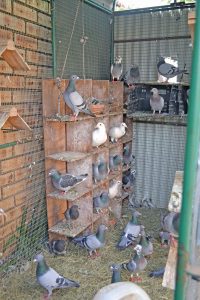
He quickly realised, though, that what he lacked in knowledge and experience, he would have to make up for by investing in good genetics, and today he buys the best that he can get his hands on.
“The prices for racing pigeons differ considerably. The cheapest bird starts at around R50, while some can cost millions of rands,” he explains.
International pigeon fanciers are prepared to pay a pretty penny for winning genetics, says Nkala.
In its March 2019 issue, Smithsonian Magazine reported that a buyer from China paid U$1,4 million (about R24 million) for a pigeon named Armando, a long-distance racing champ.
“When you see the prize money involved in these events, you understand why people are willing to invest so much money [in birds]. In some instances, even those who place second and third receive millions of rands in prize money,” says Nkala.
Unfortunately, the South African Million Dollar Pigeon Race has been postponed due to the COVID-19-related lockdown regulations.
Confidence boost
In mid-2021, Nkala attended the launch of the AfrikaPro Premier One Loft Series in Bela-Bela, Limpopo. “Well-known local pigeon fancier Stear Painter generously extended me an invite to the event, which hosted the top 50 fanciers in South Africa,” Nkala recalls.
“It allowed me to network with the top fanciers in the country and receive even more information and tips from those with proven results.”
He says there aren’t many young black people involved in formal pigeon racing, but he still believes the sport has massive potential here.
After doing some research, he discovered that there are many fanciers in different townships and communities who are seeking assistance with entering the sport. “It is crucial to involve pigeon fanciers in these areas in order to revive what once was a great sport nationwide.
“I strongly believe that most new fanciers will come out of this country’s townships and rural communities,” he says.
In 2020, Nkala started developing the Community Lofts initiative as a way of introducing the sport to people in these areas.
He also reinvented the traditional concept of a what a pigeon loft should be by changing to communal lofts. “I felt it necessary to provide something new to those who had never been exposed to the sport or even heard about it.”
The Community Lofts project functions as a training academy, where South Africans living in townships and rural communities can be educated on and become involved in pigeon racing.
“Pigeon racing can quickly become very expensive,” admits Nkala.
“Aside from the cost of the birds, the biggest expense is medicine.” However, with a communal set-up, the costs are spread amongst the various members.
The academy’s first pigeon loft was erected in Tarlton on the West Rand this year, and has yet to be officially launched.
Nkala also plans to launch a pigeon racing club at every loft, all of which will be part of the greater organisation. This will enable community members to learn about pigeon racing free of charge, while active members will pay a minimal fee for the opportunity to compete locally.
“Through Community Lofts, I am looking to enter a new era of pigeon racing by allowing those who are faced with financial constraints to compete in the sport,” he says.
Over the long run, Nkala hopes his vision will lead to job creation. He says he would love it if pigeon racing clubs and unions across South Africa ultimately adopted the system that he has developed.
Nkala believes that all aspiring professional pigeon fanciers should aim to have their own lofts eventually.
“The communal club system should remain that of the hobbyist, the amateur, and the fancier who is looking to test pigeons in order to achieve new heights.
“There should be a distinction between the professional and amateur levels within the sport in order to give the fancier a choice.”
Email Lodumo Nkala at [email protected].

